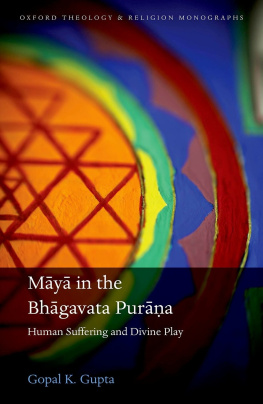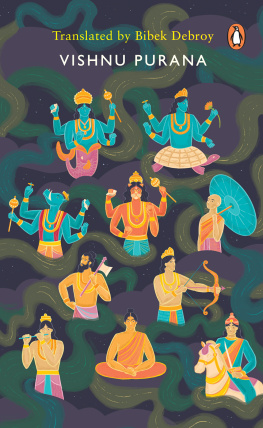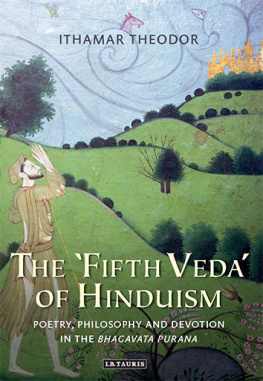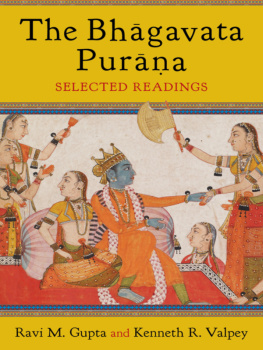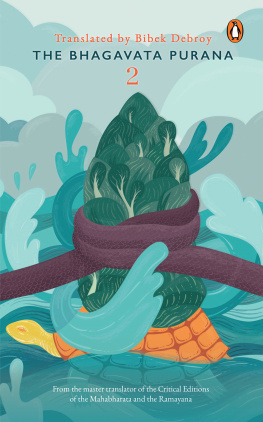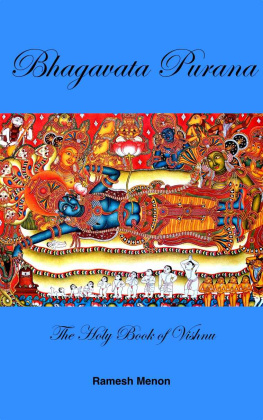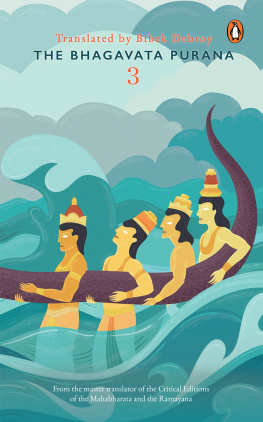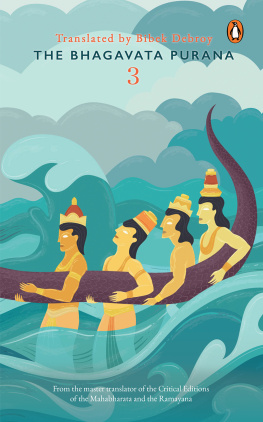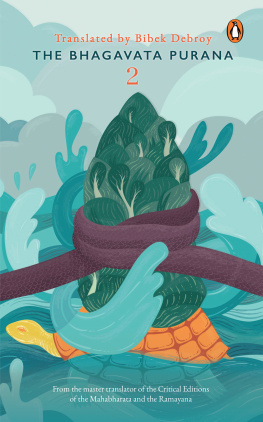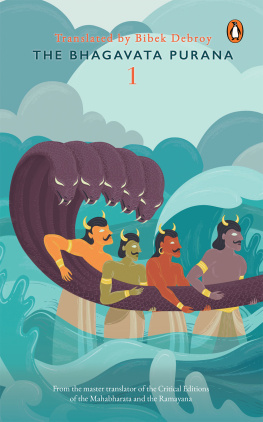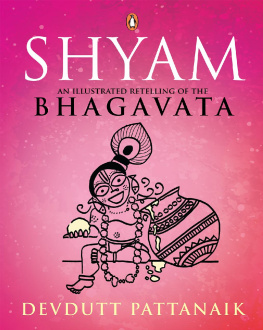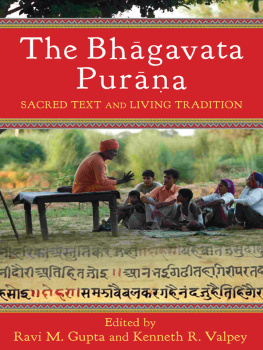Gopal K. Gupta - Māyā in the Bhāgavata Purāṇa: Human Suffering and Divine Play
Here you can read online Gopal K. Gupta - Māyā in the Bhāgavata Purāṇa: Human Suffering and Divine Play full text of the book (entire story) in english for free. Download pdf and epub, get meaning, cover and reviews about this ebook. year: 2020, publisher: OUP Premium, genre: Religion. Description of the work, (preface) as well as reviews are available. Best literature library LitArk.com created for fans of good reading and offers a wide selection of genres:
Romance novel
Science fiction
Adventure
Detective
Science
History
Home and family
Prose
Art
Politics
Computer
Non-fiction
Religion
Business
Children
Humor
Choose a favorite category and find really read worthwhile books. Enjoy immersion in the world of imagination, feel the emotions of the characters or learn something new for yourself, make an fascinating discovery.
- Book:Māyā in the Bhāgavata Purāṇa: Human Suffering and Divine Play
- Author:
- Publisher:OUP Premium
- Genre:
- Year:2020
- Rating:5 / 5
- Favourites:Add to favourites
- Your mark:
- 100
- 1
- 2
- 3
- 4
- 5
Māyā in the Bhāgavata Purāṇa: Human Suffering and Divine Play: summary, description and annotation
We offer to read an annotation, description, summary or preface (depends on what the author of the book "Māyā in the Bhāgavata Purāṇa: Human Suffering and Divine Play" wrote himself). If you haven't found the necessary information about the book — write in the comments, we will try to find it.
Gopal K. Gupta: author's other books
Who wrote Māyā in the Bhāgavata Purāṇa: Human Suffering and Divine Play? Find out the surname, the name of the author of the book and a list of all author's works by series.
Māyā in the Bhāgavata Purāṇa: Human Suffering and Divine Play — read online for free the complete book (whole text) full work
Below is the text of the book, divided by pages. System saving the place of the last page read, allows you to conveniently read the book "Māyā in the Bhāgavata Purāṇa: Human Suffering and Divine Play" online for free, without having to search again every time where you left off. Put a bookmark, and you can go to the page where you finished reading at any time.
Font size:
Interval:
Bookmark:

Editorial Committee
d. acharya m. n. a. bockmuehl
m. j. edwards p. s. fiddes
s. r. i. foot h. najman
g. ward
Deuteronomy 28 and the Aramaic Curse Tradition
Laura Quick (2017)
Sartre on Sin
Between Being and Nothingness
Kate Kirkpatrick (2017)
Making Sense of Old Testament Genocide
Christian Interpretations of Herem Passages
Christian Hofreiter (2018)
An Avant-garde Theological Generation
The Nouvelle Thologie and the French Crisis of Modernity
Jon Kirwan (2018)
Jansenism and England
Moral Rigorism across the Confessions
Thomas Palmer (2018)
A Redactional Study of the Book of Isaiah 1323
Jongkyung Lee (2018)
A Vaisnava Poet in Early Modern Bengal
Kavikarnapras Splendour of Speech
Rembert Lutjeharms (2018)
Rhythm
A Theological Category
Lexi Eikelboom (2018)
Preaching and Popular Christianity
Reading the Sermons of John Chrysostom
James Daniel Cook (2019)
Encountering Eves Afterlives
A New Reception Critical Approach to Genesis 24
Holly Morse (2020)

Great Clarendon Street, Oxford, OX2 6DP, United Kingdom
Oxford University Press is a department of the University of Oxford. It furthers the Universitys objective of excellence in research, scholarship, and education by publishing worldwide. Oxford is a registered trade mark of Oxford University Press in the UK and in certain other countries
Gopal K. Gupta 2020
The moral rights of the author have been asserted
First Edition published in 2020
Impression: 1
All rights reserved. No part of this publication may be reproduced, stored in a retrieval system, or transmitted, in any form or by any means, without the prior permission in writing of Oxford University Press, or as expressly permitted by law, by licence or under terms agreed with the appropriate reprographics rights organization. Enquiries concerning reproduction outside the scope of the above should be sent to the Rights Department, Oxford University Press, at the address above
You must not circulate this work in any other form and you must impose this same condition on any acquirer
Published in the United States of America by Oxford University Press
198 Madison Avenue, New York, NY 10016, United States of America
British Library Cataloguing in Publication Data
Data available
Library of Congress Control Number: 2020946425
ISBN 9780198856993
ebook ISBN 9780192599063
DOI: 10.1093/oso/9780198856993.001.0001
Printed and bound by CPI Group (UK) Ltd, Croydon, CR0 4YY
Links to third party websites are provided by Oxford in good faith and for information only. Oxford disclaims any responsibility for the materials contained in any third party website referenced in this work.
To my parents, who
introduced me to Krishna
Some of Indias most sacred traditions view this phenomenal world in which we live as an enchanting work of art created by the divine: a veritable canvas on which the divine paints. Even though Gods brush strokes are of superlative beauty, power and excellence, divinity himself declares in the great conversation of the Bhagavad Gt, that what appears on this canvas is a mere reflection, a metynymic manifestation, of his supreme being. Nevertheless, souls fall blindly in love with the captivating allure of this world that we live in. This book dedicates itself to that divine power of enchantment known as my: the wonderfully complex Hindu concept responsible for casting blinding love spells over soulsboth in this worldly realm, as well as in the divine realm.
The well-known, western expression, Love is blindwhich appears in at least three Shakespearian playspresents falling in love negatively, as something that obscures valuable aspects of Reality, and ultimately deprives one of love itself. On the other hand, certain traditions coming out of sacred Indiaduring the same century Shakespeare would have been thriving as a playwrightilluminate how blind-love can also play with Reality itself, in ways that unite souls and divinity together in a perfect love. Dr. Guptas book explores this juxtaposition by unraveling the finely nuanced definitions for the word my, which can mean many things, and have many senses, as we find, for example, in the translation illusion. Even the English etymology points to both the positive and negative senses, derived from the Latin, illudere, to play. Thus, my plays with our consciousness, altering our perceptions of Reality in both painful and pleasurable ways, ultimately in the interest of manifesting love.
The concept of my is predicated on the understanding that there is a metonymic character in the theistic interwovenness as the very ontological fabric of Reality: every part of existence is part of a greater part of existence such that a souls likelihood to experience separateness from, or connectedness to the divine and its all-embracing love restsat least initiallyon the necessary bedrock of free will, or freedom of choice. Thus, behind the concept of my, we find a metaphysics of love, where the soul is free to choose to be united with God and everything connected to the divine, or relate to Gods creation as if it had no connection to its creator. There is no true love without free will, and the power that facilitates this human choice is my. And yet, ironically, falling in love feels involuntary, as we become entirely consumed by a state of emotional overwhelm.
This bipartite state of emotional overwhelm is the thread that runs through the intricacies of the concept of my examined in this book. Speaking far beyond the borders of sacred India to the whole of humanity, this essential universal experience of feeling overwhelmed by a power greater than useither in a positive or negative manneraptly characterizes the Hindu concept of my, helping us understand its far reaching influence across divine and phenomenal worlds. It is no coincidence then that we find Arjuna completely overwhelmed at the start of the great work of the Bhagavad Gt. Here, Arjuna experiences the negative aspect of feeling overwhelmed by my, representing the many ways in which the human condition lends itself to feeling personally, socially, politically, and generally incapacitated. As such, worldly conflict veritably blinds Arjuna to the fact that he is in the presence of the divine, Lord Krishna. In thus mistaking his experience as something separate from the divineexisting apart from the interconnectedness of all RealityArjuna is deprived of love.
As occurred with Arjuna, my has the power to overwhelm us, to cause us to forget who we truly are, obscure our connection with the divine, and make us lose awareness of our inseparability from all Reality, minimizing our chances of participating in perfect love. On the other hand, my is also the powerthe goddess shaktithat can point us in the direction of perfect love, if we let her. The goddess, after all, facilitates more intimate connections with God. We see this dramatically portrayed when Arjuna exercises great volition and shifts his focus to Lord Krishna, reaching out to him for help. Not only is Arjunas spirit lifted and his vision of Krishna restored, but he then also becomes overwhelmed by Krishnas divine manifestation! In this situation, my participates in the revealing and concealing of Gods grandeur and majestyhis many portraitsto help pave the road to intimacy with the divine.
Font size:
Interval:
Bookmark:
Similar books «Māyā in the Bhāgavata Purāṇa: Human Suffering and Divine Play»
Look at similar books to Māyā in the Bhāgavata Purāṇa: Human Suffering and Divine Play. We have selected literature similar in name and meaning in the hope of providing readers with more options to find new, interesting, not yet read works.
Discussion, reviews of the book Māyā in the Bhāgavata Purāṇa: Human Suffering and Divine Play and just readers' own opinions. Leave your comments, write what you think about the work, its meaning or the main characters. Specify what exactly you liked and what you didn't like, and why you think so.

